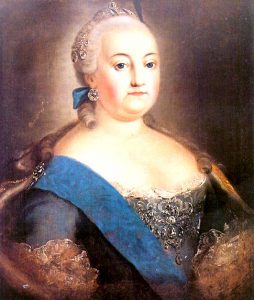(1741 – 1761)

Elizabeth Petrovna, daughter of Peter the Great, came to the throne with the help of the Preobrazhensky regiment.
Elizabeth removed the German party from the court, and her throne was surrounded by Russian people.
The closest person to her was Alexei Grigorievich Razumovsky, whom she had done as a field-marshal and count.
Elizabeth destroyed the cabinet and returned the priority to the Senate.
Disabled houses and almshouses were built, a decree on land surveying was issued, two loan banks for nobles and merchants were created, internal customs were destroyed and duties on foreign goods were increased.
In 1755, according to Shuvalov’s project, the first university was founded in Moscow and with it two gymnasiums for noblemen and raznochintsy. At the university, the newspaper Moskovskye Vedomosti began to be published.
In 1756 the first Russian theater was founded in St. Petersburg by Fyodor Volkov.
In 1757, the Academy of Arts was founded in St. Petersburg.
Elizabeth led a war with Sweden, which, in 1743, ended in peace in Abo, along which part of Finland left to the river Kymeni.
Since 1756, Elizabeth participated in the Seven Years’ War, having concluded an alliance with Austria and France against the Prussian King Frederick II, whose forces were exhausted in an unequal battle with the three enemies. And only Elizabeth’s death saved Prussia.
In 1742, Elizabeth summoned from Holstein 14-year-old nephew Peter Ulrich, son of Anna Petrovna, declared him his heir under the name of Peter Fedorovich.
Under Elizabeth, the influence of French education begins to spread.